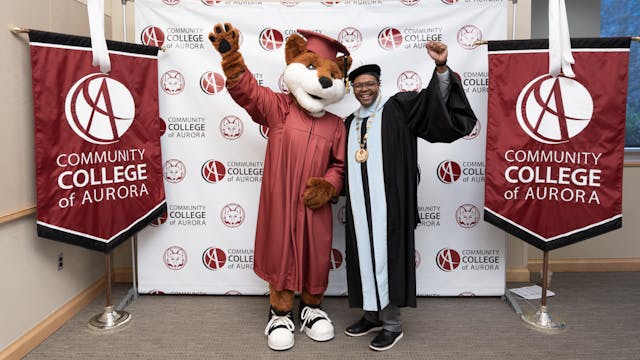On the morning of August 2, 2022, I woke up to a flood of emotions as I reflected on my one-year anniversary as president of the Community College of Aurora.
During my initial moments of reflection, I vividly recalled receiving my COMPASS and ACCUPLACER scores at my local community college years ago, and hearing for the first time that I tested at developmental levels for math. I remembered adjusting my work schedule to attend tutorial sessions almost daily and even on Saturday mornings for an entire summer, only to earn a failing grade.
I remembered working overnight shifts near Bush Intercontinental Airport in Houston, breaking down and filling 18-wheeler trucks with mail packages and wondering how my dreams to provide for my family in the manner I desired would ever be realized.
I also remembered how my acceptance into the community college’s work-study employment program served as the turning point in my academic and career pathways. It was the investment of wisdom and encouragement from my supervisors, and my own hard work, that ultimately led to what I call my lightbulb moment. I discovered my passion to serve in the creation of opportunities for others to realize their dreams. From there, the seed was planted in my mind that one day I could become a college president—and the rest is history.
Over the past 12 months, I learned more than any textbook could ever explain, more than any seminar could ever teach, and more than any video could ever portray. In a society experiencing large-scale industrial disruption, rapid technological revolution, declining higher education enrollment, demographic shifts, financial strain, and the various implications of recovering from a global pandemic, now is a historically challenging time to take the helm of an institution.
However, now could not be a more exciting, rewarding or fulfilling time to lead an institution toward the rediscovery of its institutional mission, re-embrace of its values, recalibration of its strategic plan and the reestablishment of trust in the higher education sector among the communities we serve.
To support the journeys of future college presidents and other educators, here are three key lessons I’ve learned (and rediscovered) in my first year as a community college president:
Don’t embrace the title more than you embrace the responsibility.
Your work title is just that: a title. Becoming a college president is an amazing accomplishment and truly one to be celebrated. With that said, each of us is hired with operational charges (goals) provided by either your board of directors or the chancellor/president of your system. These charges are critical and should guide all day-to-day efforts in the advancement of the institutional mission and service to your students. Create an infrastructure and system for your colleagues to succeed, learn and grow. Together, everyone works to advance the college—not you. Failure to understand this can lead to the loss of your opportunity to serve in the capacity of president.
Learn the mission, share the mission and live the mission.
An effective institutional mission statement should have five key elements:
- identify the entity providing service
- identify who is being served
- express how the entity is providing service
- explain the core elements of that service
- describe the desired outcomes of that service
Each of these core elements provides an opportunity to share with various stakeholders, internally and externally, the progress being made.
As president, your strategic agenda, actions and talking points should all reinforce these elements; actions being the most critical of all. Your personal actions have not only personal consequences, but institutional consequences. Every decision you make, every photo you take, every text you send, every email you write, every social media interaction you have should never bring shame or dishonor to you, your family or your institution.
Don’t provide more for an institution than you provide your own family.
Years ago, I recall participating in a multi-day strategic planning session. For one week straight, everything we talked about and discussed was the strategic direction of our institution—the mission, vision, objectives, goals, day-to-day operations, key performance indicators, environmental scans, finances, etc. On the third day of the retreat, I began feeling a deep sense of embarrassment and disappointment as I realized that I had failed as a husband and father to showcase this same level of intensity regarding the plans of my own family.
From that day forward, I promised to never give more to an institution than I give my own family. Just as we have trained to lead our institutions to victory, make strategic decisions, display grace and develop teams, we must provide the same for our families. Find opportunities to incorporate your family into your college activities, and schedule times throughout the week to intentionally reinforce your relationship with your significant others, children and loved ones. Most importantly, know when you’ve done enough for the day and go home to your family.
As a village of educators, it is important that we share stories, triumphs, failures and lessons learned with one another to support our collective journeys. It is my desire that by sharing these three overarching lessons learned and rediscovered over my first year as president, value is added to you and your development. More importantly, may we all hold each other accountable to the standards of honesty, integrity, consistency and persistence in the removal of barriers that impact the academic pathways of our students. May you all be mission-centered and vision-focused.


